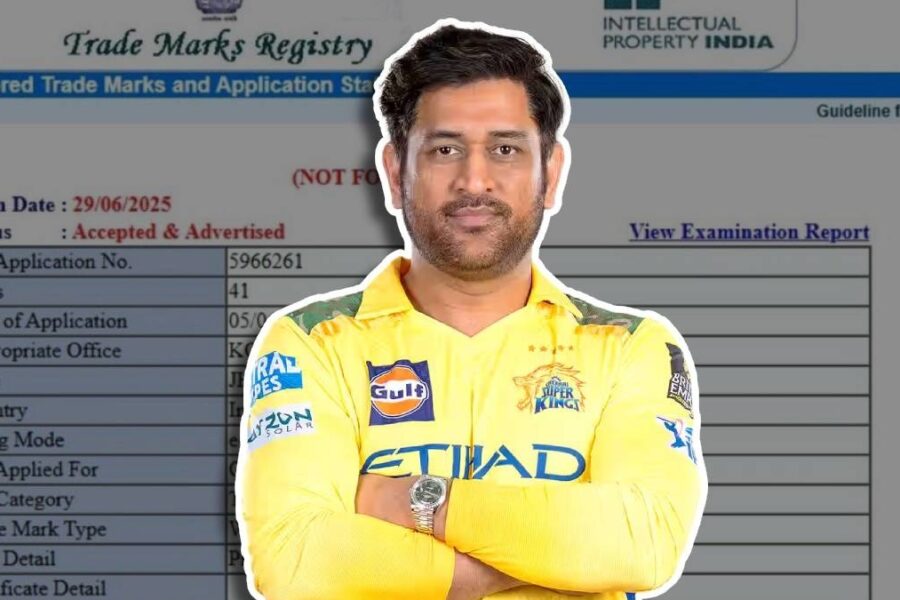In the 21st century, a celebrity’s name, nickname, catchphrase, or even voice has the potential to evolve into a commercial asset. The decision of MS Dhoni to secure the trademark “Cool Captain”—a title widely associated with his calm demeanor and successful captaincy—demonstrates a strategic move to control, commercialize, and license a nickname through formal legal protection under trademark law.
How Nicknames Become Trademarks?
Under the Trade Marks Act, 1999, a word mark can be registered if it is capable of distinguishing the goods or services of one entity from those of others. In recent years, the registrability of personal names and monikers—such as “Cool Captain”—has been upheld when it attains distinctive commercial identity.
Celebrity-owned trademarks reflect a hybrid legal identity: part IPR and part personality right. This act allow the celebrity to:
- Prevent unauthorized commercial use by third parties,
- License usage to merchandisers, media, or brands,
- Assert legal rights under infringement and passing off claims.
Valuation of Trademarks like “Cool Captain”
Valuation of a trademark means determining how much money that name, logo, word, or phrase is worth in the market.
So when MS Dhoni registers “Cool Captain” as a trademark, he now owns it — but how much is that name worth in terms of:
- Revenue it can generate,
- Licensing it to others (e.g., clothing brands),
- Selling it someday, or
- Using it as an asset in his company’s balance sheet?
Common Valuation Methods
- Cost-Based Approach – Based on development costs.
- Market-Based Approach – Based on sale of comparable IP.
- Income-Based Approach – Based on future royalty streams, commonly through Discounted Cash Flow (DCF) models.
Income Tax Implications
a. Trademarks as Capital Assets
Under Section 2(14) of the Income Tax Act, 1961, a trademark is classified as a capital asset. Therefore, any sale or transfer of the trademark is subject to capital gains taxation. If transferred to a company, the gains or losses must be disclosed and taxed accordingly.
b. Depreciation on Intangibles (Section 32)
If the trademark is held by a business entity, depreciation can be claimed at 15% on the Written Down Value (WDV) under Section 32. For this, the IP must be:
- Registered,
- Used in the course of business,
- Acquired or self-generated with quantifiable cost.
Hence, if “Cool Captain” is held by an SPV or Dhoni’s brand company, depreciation would apply annually against profits.
c. Royalty and Licensing Income
Any income earned from licensing the trademark (e.g., to a merchandise company) is taxed under “Profits and Gains from Business or Profession” (PGBP) as per Section 28.
d. Tax Planning Through IP Holding Companies
Celebrities often transfer trademarks to IP holding companies to manage, license, and account for tax more efficiently. This structure also provides:
- Asset separation,
- Depreciation benefits,
- IP securitisation options.
GST Implications
The Goods and Services Tax (GST) law recognizes trademarks as supply of services. Schedule II of the CGST Act, 2017 classifies temporary transfer or permitting use of IPR as a taxable service.
a. Applicable GST Rate
Licensing of trademarked words such as “Cool Captain” will attract GST at 18% under “intellectual property rights services”.
For instance, if Dhoni’s brand enters into a licensing agreement for ₹50 lakh with a garment manufacturer to use “Cool Captain”, GST of ₹9 lakh (18%) will apply.
Regulatory & Disclosure Norms
If the trademark is held by a company:
- It must be disclosed under Schedule III of the Companies Act, 2013 as an intangible asset.
- If the company is listed or regulated, valuation must conform to Ind AS 38 for intangible assets.
Licensing agreements and transfers must be backed by formal contracts, and stamp duties may also apply depending on the jurisdiction.
Conclusion
The trademarking of “Cool Captain” reflects the sophisticated financialisation of a celebrity’s persona. While IP protection grants exclusivity and commercial control, it also invites regulatory scrutiny under income tax, GST, and accounting laws. As celebrities increasingly turn to branding and IPR monetisation, the legal framework must evolve to address:
- Transparent valuation norms,
- Tax planning versus evasion,
- Recognition of personality rights as distinct from IP rights.
India is on the cusp of an era where names, nicknames, and voices are not just identifiers—but capital assets. The law must adapt to balance this innovation with regulation.
By Bhavika Samtani (Intern)

